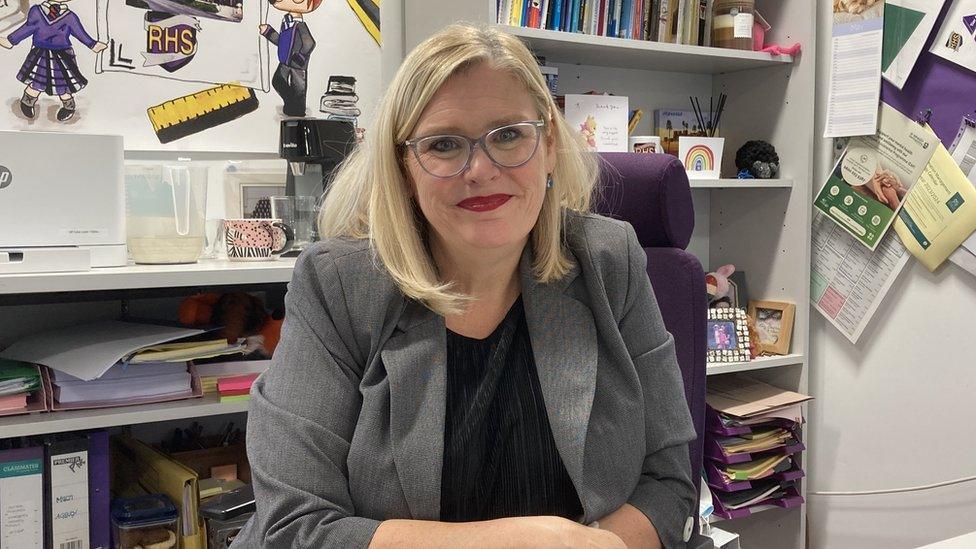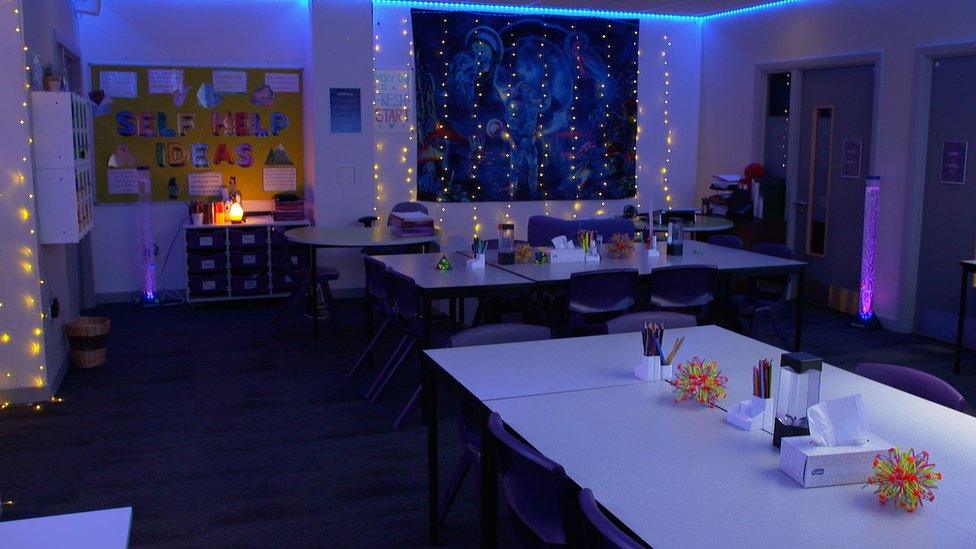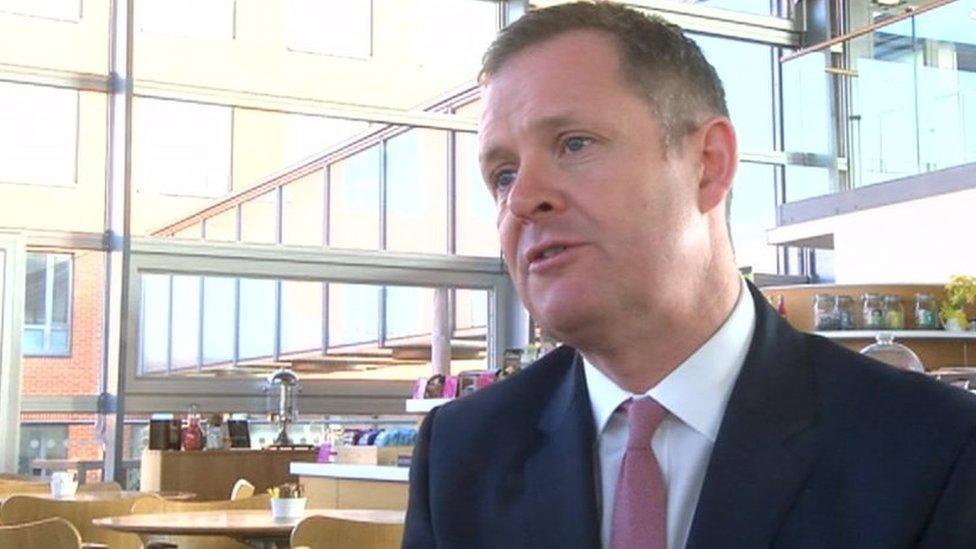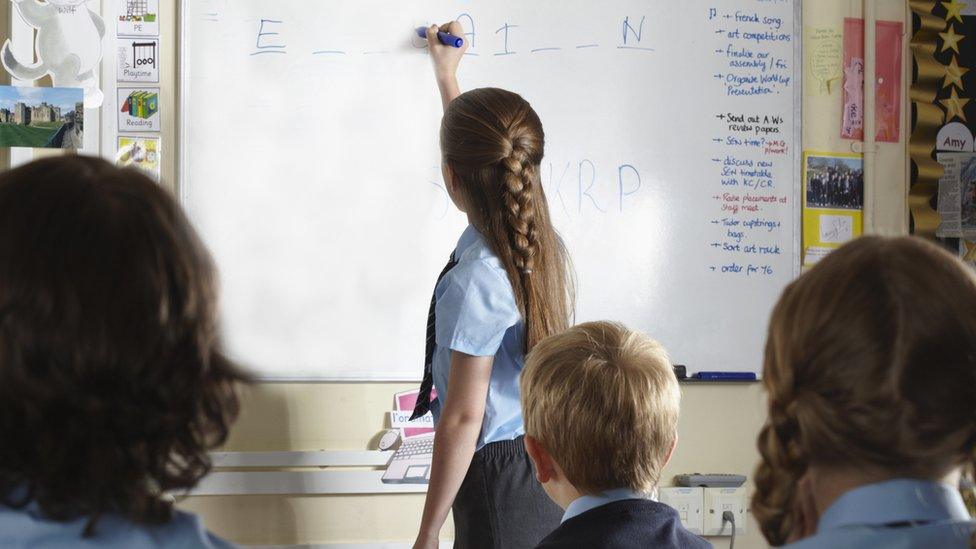Rhyl High School's shorter days to get some pupils back
- Published

Rhyl High School has reduced school days in a bid to get kids back into class
Staff are visiting pupils' homes, shortening days and running a food bank to help get children back to lessons at one school.
Figures say one in six secondary pupils in Wales is now persistently absent.
Some call attendance rates a "national crisis" and the Welsh government has set up a group to examine why children are missing school.
Rhyl High School deputy head teacher Ceri Ellis believes there has been an increase in mental health problems.
She said attendance at the school in Denbighshire was 6% down from four years ago.
"Pupils are struggling to get in on time too," said Ms Ellis.
"A lot of adjustments are needed for some children who are struggling with sleep routines, anxiety, perhaps needing to come in a bit later when they're not involved in the crowds."
Covid disruption is seen by some as having set off problems across the UK.

Head teacher Claire Armitstead says the school funds its own food bank
At Rhyl High School student welfare services have been expanded in response to attendance problems.
This included nine more staff to help with struggling pupils.
Ms Ellis said almost a third of children regularly used support services.
Self-harm and mental health problems were on the rise, she said, adding: "We see huge numbers of children with real anxiety issues."
Its head teacher, Claire Armitstead, said she "couldn't allow" her pupils to be "hurt" by a lack of support services.
On top of wellbeing initiatives, the school has also funded its own food bank.
"We're in very difficult financial situations at the moment," she said.
Staff were visiting homes of children with attendance problems.
Ms Armitstead said: "We will go and visit parents at home. We'll have those conversations and we will make it accessible for the child. So we will be adaptable.
"So if a child is struggling with a full day, we will do part days and slowly grow their confidence until they can be in full days in school.
"If they cannot come into a big class, we will take them through small class areas to grow their confidence until they come back in."
This was not cheap to do.
Ms Armitstead said: "Pre-pandemic, I had two full-time members of staff who led on pupil wellbeing. Now I have four.
"I had two members of staff who led on interventions with pupils' behaviours to allow them to be successful in school. Now I have nine."
Ms Armitstead worried she may face pressure to cut such services if there were funding reductions.

The school has wellbeing rooms where pupils can get specialist support
She said: "I worry, what do I do? How do I keep those children safe?"
According to Welsh government data, Year 11 has had the biggest rise in absenteeism.
These children were in their first year of secondary school when schools were locked down.
Kai, a Year 11 pupil at Rhyl High, believed some had struggled to readjust after so long at home.
He was in Year 7 when Covid struck and worked online at home during Year 8.
"Some people thought 'I don't want to do work, I'd rather go on my Xbox or PlayStation," he said.
When they got to secondary school the work was harder.
"We weren't used to it, so in some of our minds we were thinking, 'This is too stressful'," he said.

Welsh Education Minister Jeremy Miles says a group will be set up to tackle school absence
Jessica, in the same year, believed some pupils lost social skills.
"Everything changed and no-one really gets it," she said.
Association of School and College Leaders Cymru director Eithne Hughes said schools needed to know they would keep getting funding to tackle the problem.
Schools, she believed, were facing a "national crisis".
Ms Hughes said: "Schools do not have enough resources, they are swimming against the tide with this particular issue.
"They are struggling to get more boots on the ground, given that we've got cuts coming down the way."
Welsh Education Minister Jeremy Miles said a group would be set up to tackle school absence.
"A priority of the group will be to look in depth into the reasons behind non-attendance and bring to bear their expertise to identify actions that can bring about sustained improvements," he said.
Wales Live is on BBC One Wales at 22:30 BST on Wednesday and on BBC iPlayer

A SPECIAL SCHOOL: Life in Britain’s biggest special school
FANCY A LAUGH?: Join Rhod Gilbert as he tries out different jobs across Wales

Related topics
- Published3 March

- Published8 September 2023

- Published4 September 2023
